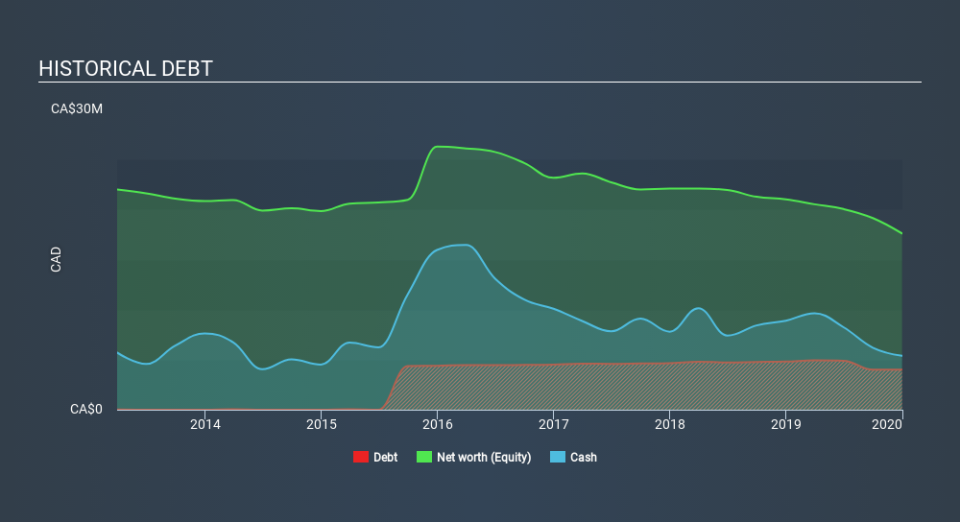Is D-BOX Technologies (TSE:DBO) A Risky Investment?

Warren Buffett famously said, 'Volatility is far from synonymous with risk.' When we think about how risky a company is, we always like to look at its use of debt, since debt overload can lead to ruin. Importantly, D-BOX Technologies Inc. (TSE:DBO) does carry debt. But the real question is whether this debt is making the company risky.
When Is Debt Dangerous?
Debt is a tool to help businesses grow, but if a business is incapable of paying off its lenders, then it exists at their mercy. Part and parcel of capitalism is the process of 'creative destruction' where failed businesses are mercilessly liquidated by their bankers. However, a more frequent (but still costly) occurrence is where a company must issue shares at bargain-basement prices, permanently diluting shareholders, just to shore up its balance sheet. Of course, the upside of debt is that it often represents cheap capital, especially when it replaces dilution in a company with the ability to reinvest at high rates of return. When we examine debt levels, we first consider both cash and debt levels, together.
See our latest analysis for D-BOX Technologies
How Much Debt Does D-BOX Technologies Carry?
The image below, which you can click on for greater detail, shows that D-BOX Technologies had debt of CA$4.00m at the end of December 2019, a reduction from CA$4.81m over a year. However, it does have CA$5.39m in cash offsetting this, leading to net cash of CA$1.39m.
How Strong Is D-BOX Technologies's Balance Sheet?
We can see from the most recent balance sheet that D-BOX Technologies had liabilities of CA$5.29m falling due within a year, and liabilities of CA$4.30m due beyond that. Offsetting this, it had CA$5.39m in cash and CA$4.25m in receivables that were due within 12 months. So these liquid assets roughly match the total liabilities.
Having regard to D-BOX Technologies's size, it seems that its liquid assets are well balanced with its total liabilities. So it's very unlikely that the CA$15.0m company is short on cash, but still worth keeping an eye on the balance sheet. Simply put, the fact that D-BOX Technologies has more cash than debt is arguably a good indication that it can manage its debt safely. The balance sheet is clearly the area to focus on when you are analysing debt. But it is future earnings, more than anything, that will determine D-BOX Technologies's ability to maintain a healthy balance sheet going forward. So if you're focused on the future you can check out this free report showing analyst profit forecasts.
Over 12 months, D-BOX Technologies made a loss at the EBIT level, and saw its revenue drop to CA$28m, which is a fall of 21%. That makes us nervous, to say the least.
So How Risky Is D-BOX Technologies?
By their very nature companies that are losing money are more risky than those with a long history of profitability. And we do note that D-BOX Technologies had negative earnings before interest and tax (EBIT), over the last year. Indeed, in that time it burnt through CA$2.2m of cash and made a loss of CA$3.7m. However, it has net cash of CA$1.39m, so it has a bit of time before it will need more capital. Overall, its balance sheet doesn't seem overly risky, at the moment, but we're always cautious until we see the positive free cash flow. The balance sheet is clearly the area to focus on when you are analysing debt. However, not all investment risk resides within the balance sheet - far from it. Case in point: We've spotted 4 warning signs for D-BOX Technologies you should be aware of, and 1 of them is potentially serious.
At the end of the day, it's often better to focus on companies that are free from net debt. You can access our special list of such companies (all with a track record of profit growth). It's free.
If you spot an error that warrants correction, please contact the editor at editorial-team@simplywallst.com. This article by Simply Wall St is general in nature. It does not constitute a recommendation to buy or sell any stock, and does not take account of your objectives, or your financial situation. Simply Wall St has no position in the stocks mentioned.
We aim to bring you long-term focused research analysis driven by fundamental data. Note that our analysis may not factor in the latest price-sensitive company announcements or qualitative material. Thank you for reading.


